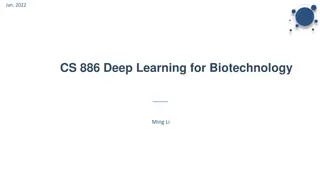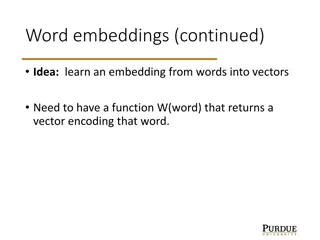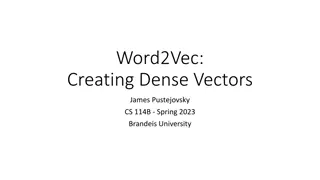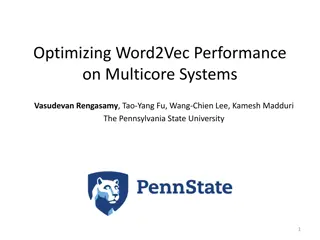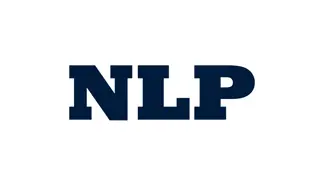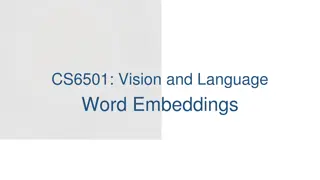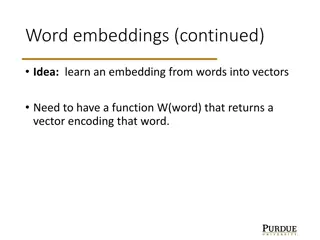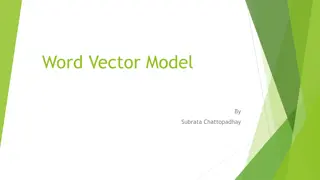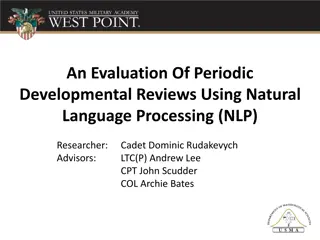Deep Learning Applications in Biotechnology: Word2Vec and Beyond
Explore the intersection of deep learning and biotechnology, focusing on Word2Vec and its applications in protein structure prediction. Understand the transformation from discrete to continuous space, the challenges of traditional word representation methods, and the implications for computational l
0 views • 28 slides
Understanding Word Embeddings in NLP: An Exploration
Explore the concept of word embeddings in natural language processing (NLP), which involves learning vectors that encode words. Discover the properties and relationships between words captured by these embeddings, along with questions around embedding space size and finding the right function. Delve
0 views • 28 slides
Understanding Word2Vec: Creating Dense Vectors for Neural Networks
Word2Vec is a technique used to create dense vectors to represent words in neural networks. By distinguishing target and context words, the network input and output layers are defined. Through training, the neural network predicts target words and minimizes loss. The hidden layer's neuron count dete
7 views • 12 slides
Optimizing Word2Vec Performance on Multicore Systems
This research focuses on improving the efficiency of Word2Vec training on multi-core systems by enhancing floating point throughput, reducing overheads, and avoiding any accuracy loss. The study combines optimization techniques to achieve parallel performance and evaluates the accuracy of the result
0 views • 30 slides
Understanding Sparse vs. Dense Vector Representations in Natural Language Processing
Tf-idf and PPMI are sparse representations, while alternative dense vectors offer shorter lengths with non-zero elements. Dense vectors may generalize better and capture synonymy effectively compared to sparse ones. Learn about dense embeddings like Word2vec, Fasttext, and Glove, which provide effic
0 views • 44 slides
Exploring Text Similarity in Natural Language Processing
Explore the importance of text similarity in NLP, how it aids in understanding related concepts and processing language, human judgments of similarity, automatic similarity computation using word embeddings like word2vec, and various types of text similarity such as semantic, morphological, and sent
3 views • 8 slides
Exploring Word Embeddings in Vision and Language: A Comprehensive Overview
Word embeddings play a crucial role in representing words as compact vectors. This comprehensive overview delves into the concept of word embeddings, discussing approaches like one-hot encoding, histograms of co-occurring words, and more advanced techniques like word2vec. The exploration covers topi
1 views • 20 slides
Understanding Word Embeddings: A Comprehensive Overview
Word embeddings involve learning an encoding for words into vectors to capture relationships between them. Functions like W(word) return vector encodings for specific words, aiding in tasks like prediction and classification. Techniques such as word2vec offer methods like CBOW and Skip-gram to predi
0 views • 27 slides
Understanding Word Vector Models for Natural Language Processing
Word vector models play a crucial role in representing words as vectors in NLP tasks. Subrata Chattopadhyay's Word Vector Model introduces concepts like word representation, one-hot encoding, limitations, and Word2Vec models. It explains the shift from one-hot encoding to distributed representations
0 views • 25 slides
Utilizing Natural Language Processing for Periodic Developmental Reviews Analysis
This study focuses on evaluating Periodic Developmental Reviews (PDRs) using Natural Language Processing (NLP) to predict cadet ratings and detect copying of responses. With objectives to analyze text statements in PDRs and investigate the prevalence of response duplication, the research aims to pro
0 views • 19 slides
